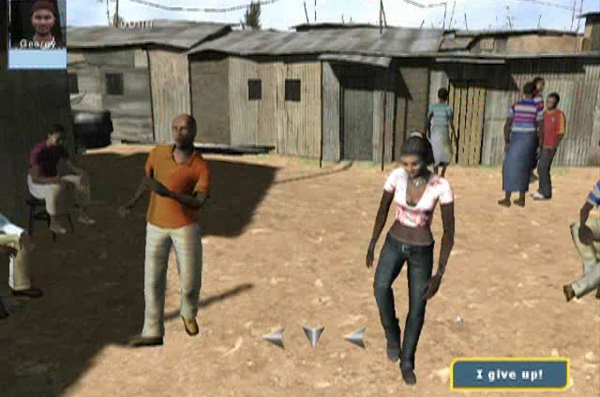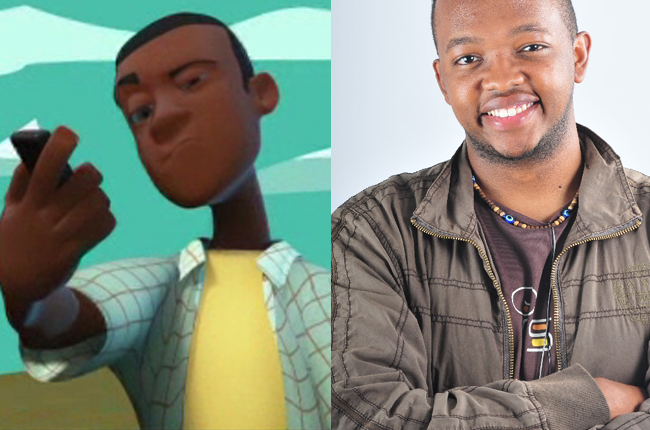How do you teach young people in Africa about safe sex in a way that’s not patronising, alienating or obstructive? Meet Mark Kaigwa, a young Kenyan who was part of a Nairobi-based Warner Bros initiative to create an action-packed computer game that’s fun to play, yet contains strong social messages. By MANDY DE WAAL.
You’re in a taxi, riding through the middle of Nairobi, carrying something that is more precious to you than anything else in the world. Catastrophe strikes when the taxi is hijacked. But the real story begins when you join forces with four other strangers in the vehicle get out of the situation alive and find your stolen bounty.
That’s the compelling story line for an exciting computer game created by Warner Bros in conjunction with a 22-year-old Kenyan writer Mark Kaigwa. What’s remarkable about the game is that it is steeped in Kenyan culture and engages local youth in a gripping multiplayer format while educating them on HIV, Aids and safe sex.
Expertly made with brilliant graphics, “Pamoja Mtaani” includes hip-hop music from local greats like Jua Cali, Redsan, Prezzo and Amaniscript. The PC game shows that collaborations between Hollywood and Africa can yield innovative, meaningful solutions, and how private sector and NGO partnerships can deliver results in areas where many government initiatives have failed. Developed by Virtual Heroes Inc and Warner Bros Entertainment Interactive, “Pamoja Mtaani” was sponsored by the US President’s Emergency Plan for Aids Relief (Pepfar).
Watch the VOA report “Video Games Helps Kenyan Youth Avoid AIDS”.
The problem with a lot of HIV and Aids education is that it is, exactly that, education. Droll, parochial safe-sex messages aimed at youth who are at a stage in their lives when they want to embrace risk and experiment is likely to alienate or switch young people off.
What’s cool about “Pamoja Mtaani” (which means “Together in the ‘hood”), is that like World of Warcraft or Battlefield, people want to play it. There’s high drama, action, the entire storyline is locally relevant and set in Kenya.
“This was a mind-blowing opportunity because one of the things about the game that is fascinating is that all the action takes place in Sheng, which is a slang spoken in Kenya,” says Kaigwa. Sheng is primarily based on Swahili, English and a few other vernacular languages. “Sheng is a dynamic language that changes so often that there are probably places I could go right now where they would speak a Sheng that I almost would not be able to understand.”
The game was developed by Warner Bros, and Kaigwa was a principal writer, along with Cajetan Boy, an accomplished screen writer and director from Kenya. Also part of the project was a behavioural change expert who ensured the story and the game would elicit a shift in thinking from the people who played it.

“In terms of process, we would write in English, get approval and then translate everything back into Sheng so that people who experience the game can see how genuine and realistic it is. It was a huge creative challenge which I am so glad we met because the positive feedback we’ve been getting on the game has been incredible,” said Kaigwa speaking to The Daily Maverick from Kenya. “I am glad we could represent the city of Nairobi, where the game is based, in a way people felt was authentic. That the game is seen as accurate in terms of everyday life in the city.”
More important to Kaigwa is the fact that the social messaging in the game is subtle and doesn’t interfere with the gaming experience, but is strong enough to make a difference to people’s lives. “The game works on a couple of levels. Woven into the story is very, very subtle behaviour change messaging and that’s what has led to the game receiving such widespread acclaim and recognition. People are realising this is a very different way to approaching a social problem that is always addressed in a very specific way.” Here Kaigwa is talking about your typical safe sex education. Another important aspect of the game is that it collects data from the youths who play the game, and enables social scientists to learn more about prevailing behaviours and attitudes towards HIV, Aids and safe sex. This in turn can enable the creation of better initiatives and programmes to tackle the problem.
Watch Mark Kaigwa speak at TEDxNairobi 2010.
“In the game there are different messages geared to youth who have disparate social positions or outlooks on life. Because this is a role-playing game you make decisions on behalf of the character and you act out the consequences of those decisions through the character.” The characters include a carefree and sensual musician called Lady D, a superstitious football-loving guy called Lefty, an übergeek called Sean, a hot-headed guy Georgie who preys on girls and Judy, a smart medical student.
The game is available as a free-to-play initiative in Nairobi, where it can be found in youth centres or at gaming arcades alongside the city’s slums. “About a thousand or so kids play the game each week, and thanks to the research Warner Bros is able to compile concrete research statistics about the effect the game is having. As the game is played the research helps determine how the game engages you and at what risk level it engages you. Then there are game masters who act as peer councillors in the game, and they make a strong impression because of the mentoring and guiding role they play in a very relevant context.
“You can’t sit younger audiences down and tell them about the dangers of HIV/Aids, you need to engage them. This game makes them part of an exciting adventure they invest in, and that’s why it is working to change behaviour and getting such a positive response,” says Kaigwa.
A writer who by his own admission is involved in more projects than is good for him, Kaigwa’s next effort is a short film called “Dawa” and is a story about a couple of swindlers. “The film is a story about a grandfather and his grandson who are both con-artists in the big city, and are at their wits’ end. They move back to their home village to pull off their biggest con yet and get a lot more than they bargained for.” When Kaigwa’s not writing scripts, developing games or involved with social initiatives, he’s busy with a number of start-ups and entrepreneurial online businesses.
Kaigwa describes himself as an innovator, and you’ll understand why this is apt when you hear how he’s marketing his short film. “I am busy creating a Web comic that details the prequel of the film, and I am also busy with a mobile game that covers what happens after the film. Basically what I am doing is creating a bigger experience, or offering depth to the experience of the story outside of just the film. What I’m doing is creating a culture or an immersion, and trying to find a viable way to sustain this.”
A graduate of East Africa’s Maisha Film Lab which has been a training ground for many great film-makers in Kenya, Kaigwa is experimenting with an innovative blend of gaming, filmmaking, mobile and digital experiences to businesses for the social good that also make money. “The innovation economy is the best place for me. For the first time in history Africa is not behind. Africa is teaching things to the West and there is no better time to be in Africa than now. I want to innovate in the fields of writing, film, digital and mobile for myself, for other individuals, for companies and for the collective good of a country that I am passionate about.”
Given much of the work Kaigwa is doing changes attitudes and behaviours on significant social issues, let’s hope he succeeds. DM
Read more: “VCs, African start-ups meet to discuss funding issues” on ComputerWorld, Watch Mark Kaigwa being interviewed on M-Net’s “The Patricia Show”:



















 Become an Insider
Become an Insider